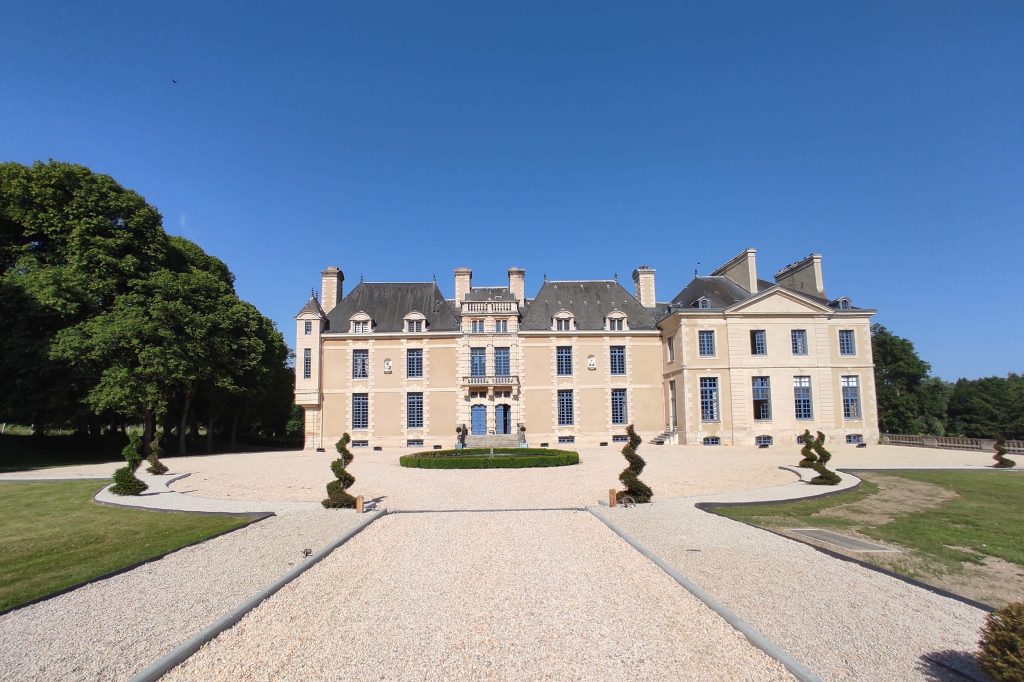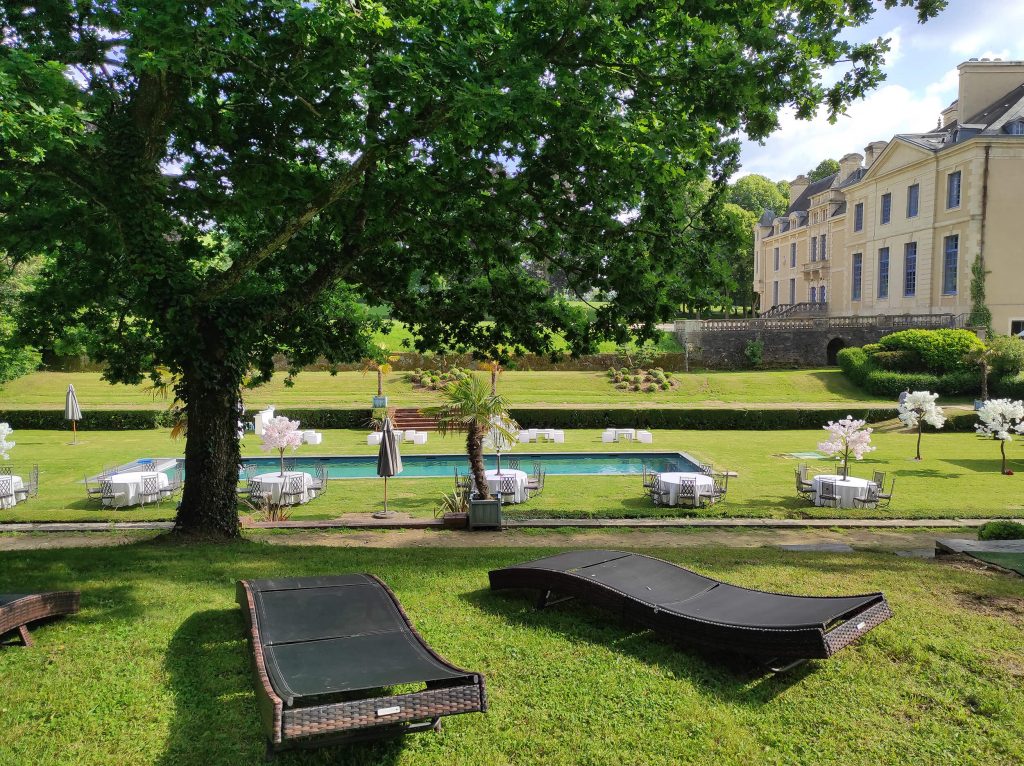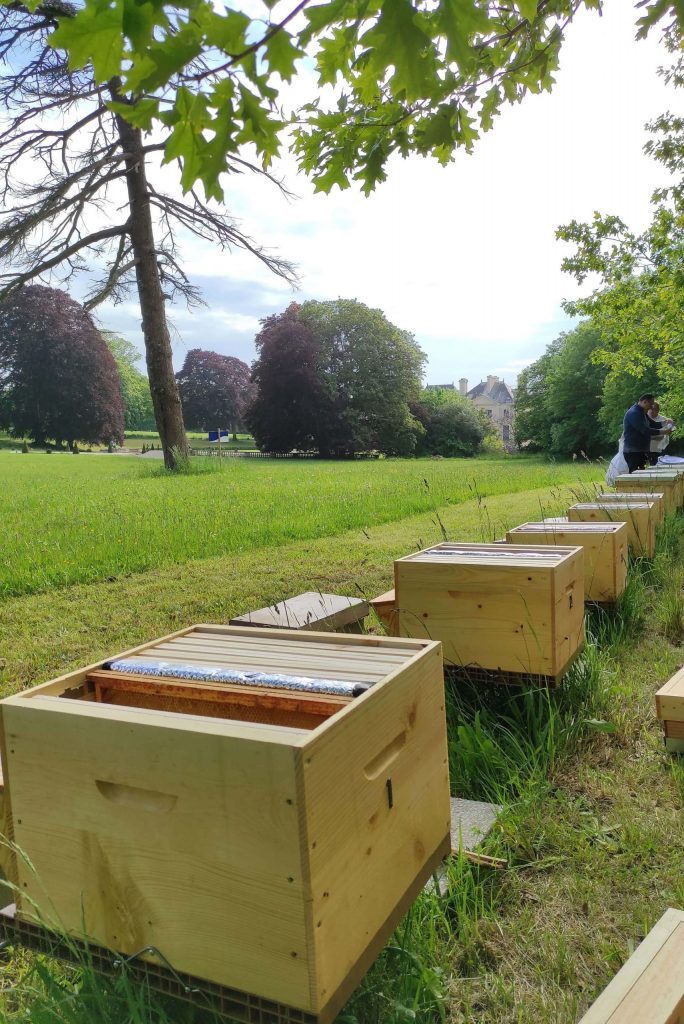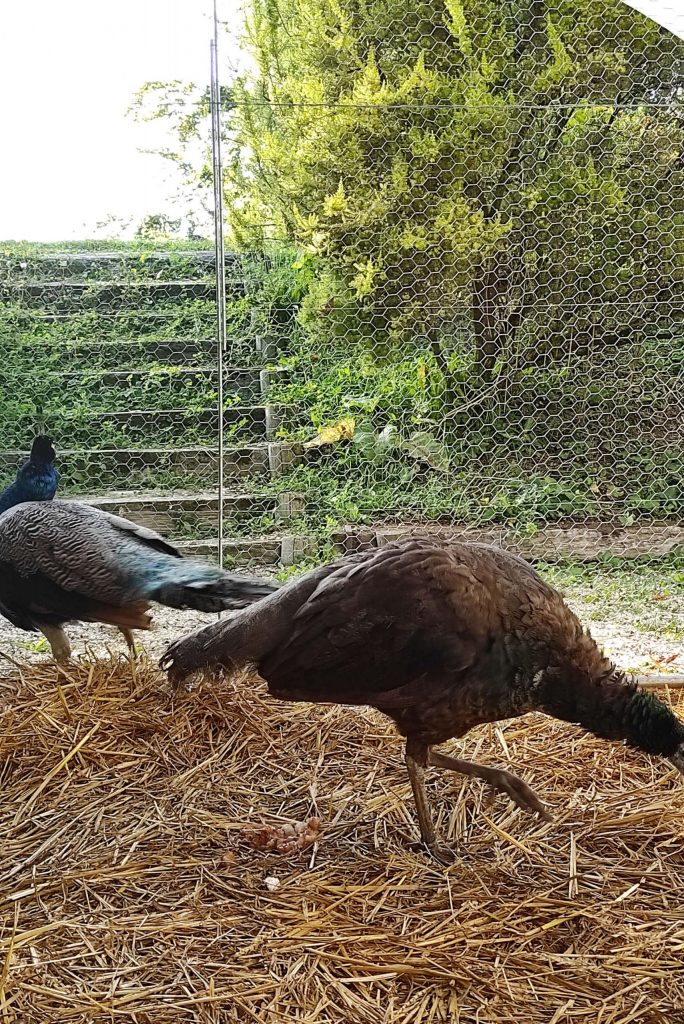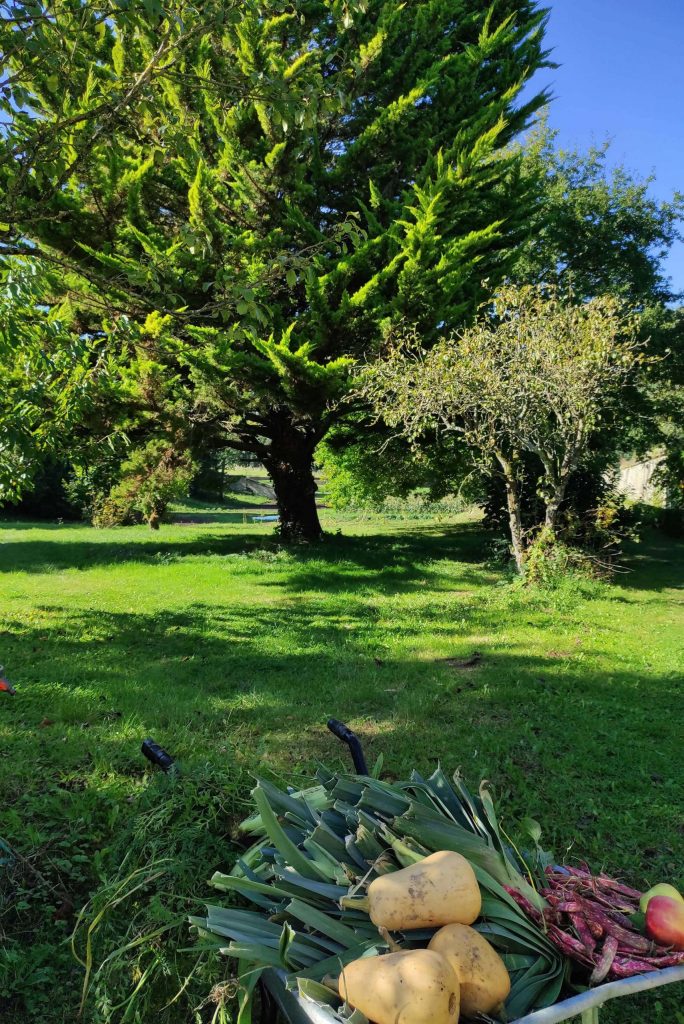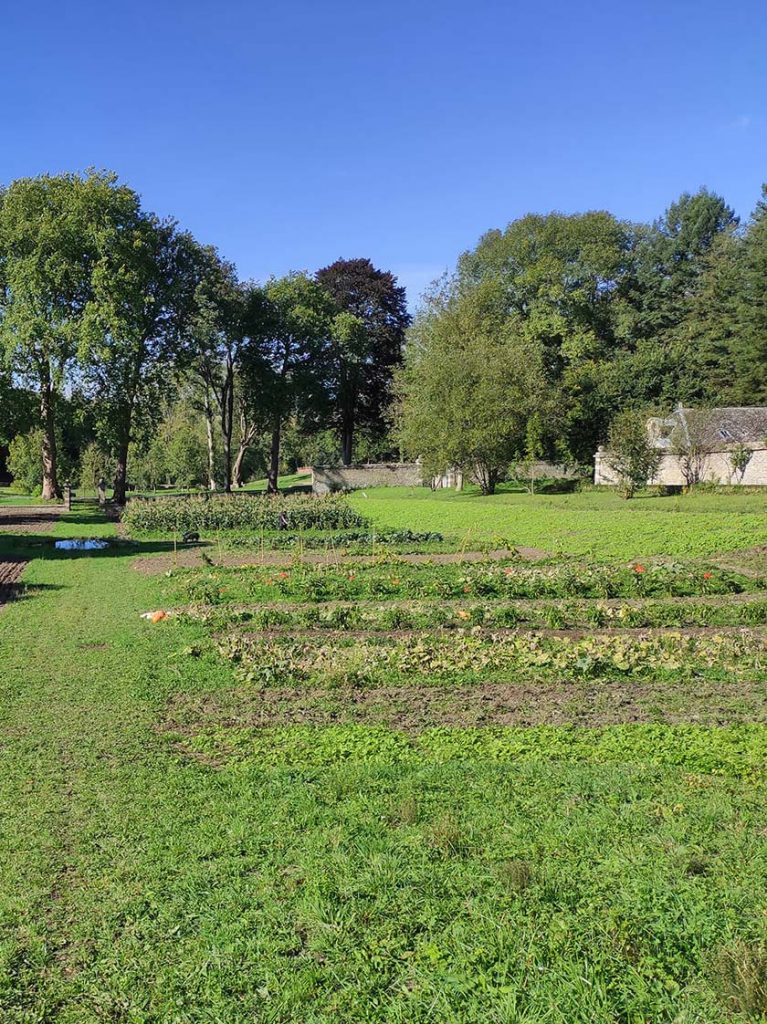

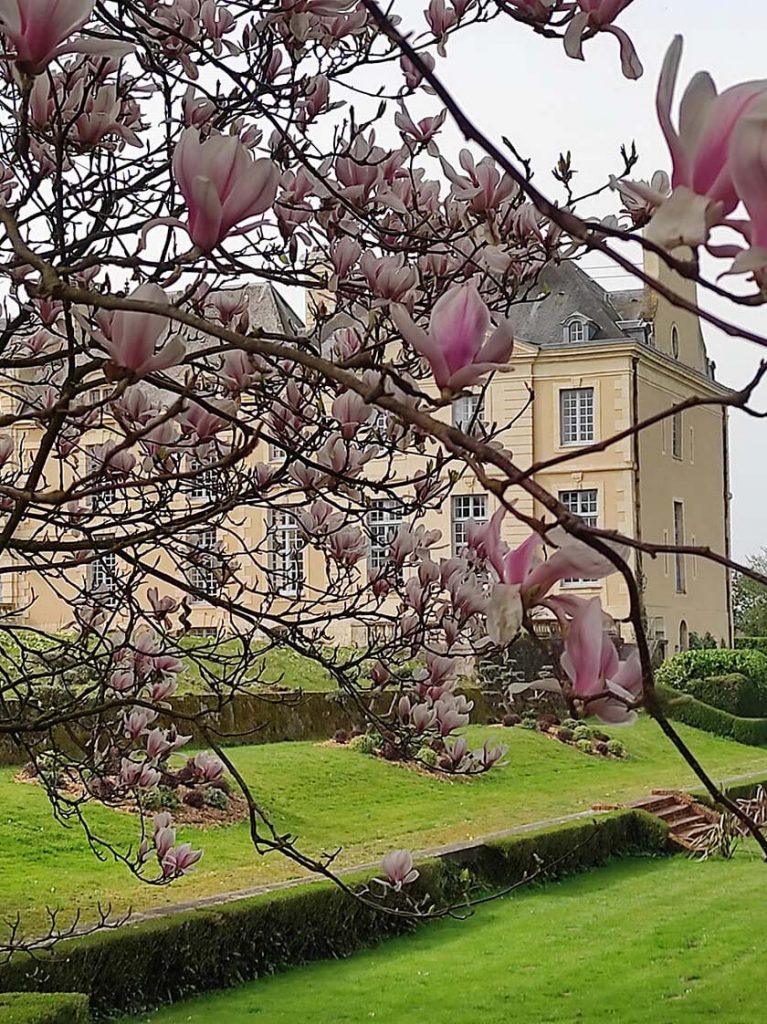
Set in 37 hectares of parkland, the gardens of Château de Villers Bocage offer a range of themes and moods.
A 300-metre driveway, finely decorated with over 100 yew topiaries, and a stone balustrade with two guard lions, mark the path leading to the foot of the château.
The outdoor pool terrace is designed to immerse you in a soothing atmosphere. Hundred-year-old olive trees and a host of other species adorn this area. Panoramic views of the swimming pool and the château from the upper terrace make this corner of the park an ideal place to relax or organise your events or receptions. Indulge in a reverie in this timeless setting.
Phyto-purification: respect for nature in a sumptuous setting
As part of its commitment to respecting its history and ecosystem, the Château de Villers Bocage is equipped with a state-of-the-art phytodepuration system. Installed in 2021, this system ensures that the château’s wastewater is treated naturally, without the need for a septic tank. A reed garden with a natural filter tank ensures purification. The purified water continues down the castle’s small river, first to a natural retention basin and then to the ponds. In this way, the water cycle is respected, recovered and enhanced to protect the environment. This is the ideal habitat for many endogenous amphibious species, unusual invertebrates and wild orchids.
Activities in the castle’s parks and gardens for hire
Whether you’ve decided to hire the Château de Villers-Bocage for a wedding, a company seminar or a holiday, you’ll have access to its gardens and parks. This is excellent news, as the activities on offer in the estate’s green spaces are sure to create unforgettable memories.
The castle’s garden for hire promises a quality wedding shoot
The Château de Villers-Bocage in Normandy is an ideal location for a wedding celebration. Not only do the facilities and services available to guests and future brides and grooms allow a great deal of freedom in the choice of entertainment, but the setting of the rented château surrounded by its parks and gardens brings the event closer to a fairytale.
A fairytale that can be immortalised through photo shoots during the wedding. You will have free access to the lush natural surroundings of the grounds of Château de Villers-Bocage, or to the carefully tended gardens. The bride and groom, friends and family will be able to capture these precious moments in an idyllic setting.
The parks and gardens are accessible for all bookings of the château. Afterwards, for an evening or several days, share these unforgettable wedding moments with your nearest and dearest. Indeed, Château de Villers-Bocage is reserved exclusively for you, offering a private and intimate experience. During your stay, you are the only guests — no other group shares the estate.
Go green with your business colleagues
Usually confined to impersonal, urban buildings, company employees rarely have the opportunity to spend time outdoors, in a natural environment conducive to concentration. During a seminar at a rented château, they will be able to explore the 37 hectares of parkland and gardens in complete freedom.
Perhaps it’s also an opportunity to create team-building workshops to encourage cohesion between teams? Having to find your way around vast natural areas, crossed by a peaceful stream, or dividing up the teams across the gardens of the château for hire are all opportunities to get to know the colleagues with whom you work on a daily basis in a different way.
The gardens and parks of Château de Villers-Bocage offer a wide range of activities to liven up your seminars. Don’t hesitate to contact us to find out more about what we can do to make your corporate events a success.
A fitness trail in the grounds of the castle for hire
Make the most of a stay at our chateau in Normandy, and discover a fitness trail that’s perfect for keeping fit. Surrounded by magnificent centuries-old trees, carefully tended bushes and ponds, this trail is a pleasant way to get back into the swing of things during your stay in our castle and gardens.
It’s a great way to get back to nature, in a naturally green environment with a variety of flora that will delight all lovers of wide-open spaces that are ideal for getting away from it all, both physically and mentally. Discover our fitness trail through the parks and gardens of the holiday castle at Villers-Bocage.
Frequently Asked Questions (FAQ) about the castle garden for hire
What is the total surface area of the Château de Villers-Bocage? It is surrounded by 37 hectares of green space. The gardens and parks are freely accessible to anyone booking a full stay at the château. What is the surface area of the gardens and parks that make up the Château de Villers-Bocage estate?
Our teams can help you set up other activities, such as horse riding, archery and others. Contact us to find out more about the activities available in the gardens rented with the castle.
The gardens and parks are reserved exclusively for people who have booked the entire castle.

